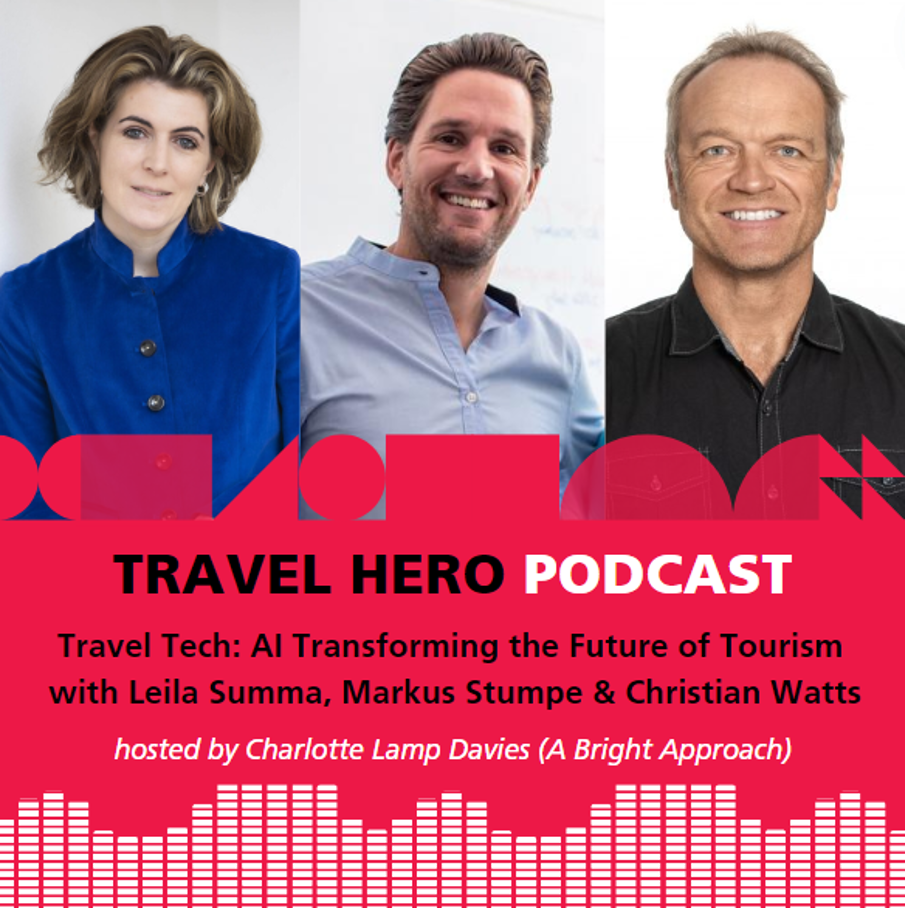Page content
Experts offer insights on how to make AI work for tourism organisations
Charlotte Lamp Davies from A Bright Approach looked at the opportunities of AI in the tourism industry and let three qualified experts have their say on the subject. Leila Summa from Play To Change, which calls itself a “boutique for digital transformation“, kicked off the discussion by examining the two phases of implementation and adaptation. Companies often failed to successfully apply AI, and were unable to quantify results such as conversion rates or better turnaround times for services, she said.
AI is a must, not an add-on
Asked what key steps should be taken to implement AI, she said there was no magic formula. It was important however to understand that its success often depended more on corporate culture than technology. So it was all the more important to communicate a clear strategy, and in addition to the economic upside for the company to show the benefits of innovation for individuals.
As was once the case for social media, a certain amount of pressure could be built up by noting that the competition already used AI, she said. A certain narrative was also needed to thoroughly convince the company’s executives. AI would not just be an add-on for them, so there had to be a debate. That required a strategy, said Summa, in order to explain its complexity, followed by a narrative with convincing ideas in order to emphasise why AI was not an option, but a must.
Where does the industry stand?
Afterwards, Charlotte Lamp Davies talked to Markus Stumpe, CEO of Cruisewatch, which specialises in AI tools for the cruise industry. Asked how the travel industry was adapting to AI, he gave a positive verdict. It was already being used to good effect in customer service and for making personalised recommendations, he said. However, the industry was not necessarily a trailblazer here. 75 per cent of companies were not yet using AI or were only just starting to do so. Asked about the benefits, Markus Stumpe quoted a Harvard survey, according to which workers using AI produced measurably better results than others, both in terms of quality and speed.
In general, his advice to smaller companies was to specify their goals before implementing AI and to select manageable tasks. Expanding an existing project was often wiser than automating from the bottom up and often produced better results, he added.
Another question companies had to ask themselves was whether to develop the applications they needed in-house or to buy existing products. His advice was clearly to purchase existing products in order to gain as much knowledge as possible from the latest developments. It was also important to always involve in-house teams and bring them on board during trials for example. Individual cases required testing, he said.
Small steps and swift decisions for successfully implementing AI
Asked by Charlotte Lamp Davies about the typical challenges, he said companies frequently overestimated the quality of their data, which was not necessarily of use to AI. It was important to take small steps and not overdo things, he said. In general, smaller organisations were frequently better equipped to implement AI tools than larger ones, as their hierarchies often permitted quicker decision-making for example.
Not least, Stumpe advised not to hold out for a magic AI tool that offered the perfect solution. AI’s potential was frequently overrated. However, putting off the decision for a few years was not an option. The time to get started was definitely now, he said.
Specific uses for Tours & Activities
Rounding off the podcast, Christian Watts, CEO of Magpie Travel, offered an insight into the Tours & Activities market.
He stressed that this market was traditionally slow to take new developments on board, but that it could easily make use of AI without expert knowledge or large numbers of tech specialists.
Asked about specific uses, he said AI was being used in this field for simple tasks such as product descriptions, optimising conversions and simple templates for ratings and emails. Thus, anyone could set it up quite quickly. While it was not a revolution, it noticeably improved work efficiency, he said.
Overall, it was up to every market player to closely follow developments. Those who avoided new tools risked their competitors pushing them out of the market.
Concluding, Charlotte Lamp Davies asked how Google and other search machines were changing with the use of AI.
According to Christian Watts, searches were indeed being carried out differently than in the past. It was therefore essential for tour & activity organisers to list as much information about their company as possible on their websites – including exact opening times for example. Nowadays both customers and new technologies were searching content to learn from the available data.
Asked if there was a final takeaway, Watts said that a market full of so many AI innovations could be overwhelming and confusing. So it was all the more important to focus on tools such as Gemini or ChatGPT and openly communicate with the system and an assistant about all kinds of things – including one’s own corporate strategy. In the end, AI never passed judgment and, unlike humans, it was oblivious to “stupid questions“.
Click here to listen to the podcast in full length:

.svg)


